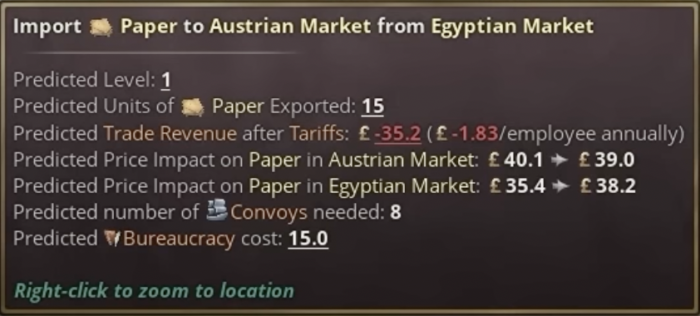In today’s article, we will discuss trade and markets. I say up front that trading will be complex and will be one of the core parts of the game. This article is part of the economy wiki where you can find more information on how the economy works in Victoria III. But let’s take a look at the markets first.
The basic component of the game is to be the previously mentioned market on which individual raw materials or goods are traded. This is where the principle of a free market ala “supply/demand” normally operates. The price will rise if there is a shortage of raw materials on the market, and conversely, the price will fall if there is a surplus of raw materials on the market.
So if you find an opportunity on the market and you start producing expensive raw materials, you can start selling them. If you don’t oversaturate the market, you can make a lot of money and improve your budget.
Zones of markets
The basis of everything is that every country is a part of a market. In case you are a small country, you will probably have a small market with your country only. But in case you have a bigger country that has influence and so the power to create custom unions, you will be able to join…
What is custom union? Custom union is great way how to expand your markets and get more goods. Powerful country must extends their markets and weaker countries can gain access to more resources. – read more about custom unions.… or if you take over a state, it automatically becomes part of your market influence. How strong the economy is under that market will potentially influence whether you play a good economic game or not. In the case of being part of multiple AI states, you will have to take the initiative when you play multiplayer so it could be an interesting way to cooperate better.
But don’t worry you won’t be locked into just your market. To trade with others you will need to use trade routes…
Trade routes
… they allow you to make arrangements with another country and exchange specific raw materials. So if you have a surplus, you can sell. And conversely, if you have a minimum of something, you’ll be able to import that particular raw material into your country.
The setup of each path will look like this…

…you’ll always know what kind of price shift it will make for you. As you can see here, if you’re playing for Egypt, the price of paper will increase slightly. It should be added that each trade route will cost you something, so you won’t be able to have an unlimited amount of them.
Each trade route will cost you regardless of the bureaucratic conditions and in case you trade by sea you will also need ports and convoys. As far as I understand it, each route will gradually charge and increase the “level” which will solve how many resources you will be able to trade in the future. However, be aware that we will know more about it when the game will be online.
Beware of dependency on another country!
Along with trade, it would be good to explain the basic concept of an economic war that could happen. If your country builds up a dependency on a commodity for which there is no other supplier, you could have a problem sooner or later.
I definitely don’t recommend looking for food and weapons suppliers. Build this critical infrastructure yourself! In case you become dependent on someone, you might have a problem with someone embargoing you and you won’t be able to trade much, or maybe the country in question will stop supplying you and you’ll have a problem.
Always keep in mind that you want to have a plan for who you will establish a relationship with in case the previous one stops delivering. At the same time, I’m hoping a bit that this game will be played by the AI which will use embargoes and other mechanics.